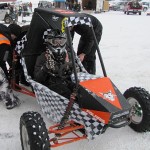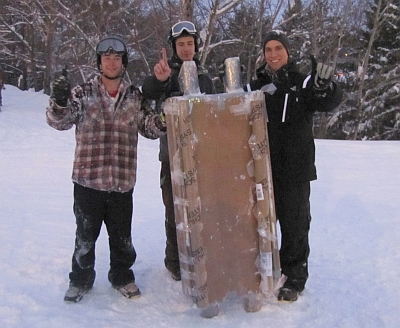 The 2013 Winter Baja was held Saturday, Feb. 16, near the Student Development Complex at Michigan Technological University. The event kicks off National Engineers Week at Michigan Tech. More than 50 off-road vehicles from 22 universities raced around a one-mile snow course. Click here for a video report, photos and links ot news articles.
The 2013 Winter Baja was held Saturday, Feb. 16, near the Student Development Complex at Michigan Technological University. The event kicks off National Engineers Week at Michigan Tech. More than 50 off-road vehicles from 22 universities raced around a one-mile snow course. Click here for a video report, photos and links ot news articles.
Michigan Tech ASME’s (American Society of Mechanical Engineers) Annual Cardboard sled race was held on Mt. Ripley, on a beautiful calm, 27 degrees Saturday evening, February 23, 2013. Cash prizes were awarded to the top three finishers. (1st $75, 2nd $50, 3rd $25).
See a YouTube Video Clip: ASME Cardboard Sled Race on Mont Ripley
Mechanical Engineering – Engineering Mechanics Graduate Seminar: Thurs. Feb. 28 at 4:00 in 112 MEEM. Dr. Steve Przesmitzki, Technology Development Manager, United States Department of Energy’s Vehicle Technologies Program.
Topic: DOE Fuels and Lubricants Subprogram
Steve Przesmitzki is a Technology Development Manager within the United States Department of Energy’s Vehicle Technologies Program. Steve’s responsibility is to support the development of energy policy and management of research programs as applied to fuels and lubricants in transportation. Steve has worked at DOE Headquarters in Washington, DC since 2009. Steve’s prior work experience includes 2 years as a project manager for DOE’s National Renewable Energy Laboratory and 14 years in vehicle powertrain design and development at Ford Motor Company. While at Ford, he spent significant time developing powertrains for flexible-fuel vehicles as well as developing on-board diagnostic systems.
Steve holds a PhD from the Massachusetts Institute of Technology, a MS from the University of Michigan, and a BS from Kettering University; all in Mechanical Engineering. He is also registered as a Professional Engineer in Michigan
Abstract: DOE Fuels and Lubricants Subprogram
The presentation by Dr. Przesmitzki will discuss the U.S. Department of Energy’s end-use transportation fuels and lubricants research program. The research is coordinated within the Vehicle Technologies Program in the Office of Energy Efficiency and Renewable Energy and supported by National Laboratories, universities, and industrial partners. The program is designed to support the major R&D programs in transportation research, including the U.S. DRIVE Initiative and the 21st Century Truck Partnership. This program has been undertaken to enable current and emerging advanced combustion engines and emission control systems to be as efficient as possible while meeting future emission standards. The program also addresses
petroleum displacement and efficiency improvements through the use of alternate fuels and blending components, and improved lubricants. The presentation will include an overview of the Office of Energy Efficiency and Renewable Energy organization, highlights from previous fuels and lubricants R&D programs, and a summary of current work. The presentation will also discuss some of the opportunities and challenges in running R&D programs within DOE and potential ways to work with DOE as a partner.
Mechanical Engineering – Engineering Mechanics Graduate Seminar: Sean Egmon
Assistant Director of Services, AVL North America; Thurs. Feb. 21 at 4:00 in 112 MEEM. His presentation is entitled, ‘Success in Engineering is More Than an Equation’
Sean Egmon is the Assistant Director of Services and heads a department of 90 application and service engineers at AVL North America. Sean is a graduate of Wayne State University and has worked in the engine and power train community for over 25 years. After almost a decade at Ford Motor Company in the engine testing laboratory, Sean helped a small engineering company grow 7 fold in the data acquisition and dynamometer control market. He came to AVL to establish a group of applications engineers and technical experts. The localization of these industry experts has helped AVL become the market leader in North America and driven change in AVL’s global service delivery models. AVL is the world’s largest independent company for development, simulation and testing technology of power trains (hybrid, combustion engines, transmission, electric drive, batteries and software) for passenger cars, trucks and large engines. With over $1.3 billion in annual sales, offices in 45 countries and over 6250 employees, AVL is at the forefront of engine and power train development, testing and instrumentation.
Abstract: Success in Engineering is More Than an Equation
Success in engineering comes from working with people. Learning how to work with other engineers and non-engineers alike is paramount to accomplishing your goals. If you want to develop leading edge technical solutions you need knowledge, experience and creative thinking. These things come from groups of engineers, designers, and marketing people. Success requires leadership to get these different people working together to accomplish great things.
Mechanical Engineering – Engineering Mechanics Graduate Seminar: Professor Venkat Krovi from the Automation Robotics & Mechatronics Lab in the Mechanical and Aerospace Engineering Department at SUNY- Buffalo will be the ME-EM graduate seminar guest for Thurs. Feb. 14 at 4:00 in 112 MEEM. His presentation is entitled, ‘Cooperative Payload Transport by Robot Collectives’.
Prof. Venkat Krovi is currently an Associate Professor in the Mechanical and Aerospace Engineering Department at the State University of New York at Buffalo where he directs the Automation Robotics and Mechatronics (ARM) Lab. He received his Bachelor’s degree from the Indian Institute of Technology Madras and his Masters and Ph.D. degrees in Mechanical Engineering from the University of Pennsylvania. His research interests are in the lifecycle treatment (design, modeling, analysis, control, implementation and verification) of novel robotic and mechatronic systems, with emphasis on both theoretical formulation and experimental validation. The underlying research theme has been to take advantage of the “power of the many” to unlock new opportunities in various plant-automation, automobile, defense and healthcare/surgical applications. The principal opportunities lie in building upon heterogeneous loosely-interconnected physical- and information-systems and architecting high-confidence and reconfigurable operational capabilities in the presence of uncertainties. His work has been funded by NSF, DARPA, ARO as well as numerous state and industrial grants and has received multiple awards, including the National Science Foundation (NSF) CAREER Award, Petro-Canada Young Innovator Award, several best poster, conference and journal paper awards. His work has been published in more than 90 journal/conference articles, book chapters and patents. Within ASME he was past Chair of the Robotics Technical Committee (Dynamic Systems and Control Division) and is Chair-Elect for the Mechanisms and Robotics Technical Committee (Design Engineering Division). He has served as the Conference Chair of the 2010 ASME Mechanisms and Robotics Conference and is slated to serve as General Chair of the 2014 ASME International Design Engineering Technical Conferences. Within IEEE, he has served as Finance Chair for CASE 2010, ICRA 2012, IROS 2014 and is a member of the Conference Activities Board and the Industrial Activities Board of the Robotics and Automation Society. He has previously served as an Associate Editor of ASME Journal of Dynamic Systems, Measurement and Control, and the IEEE/ASME Transactions on Mechatronics – he currently serves an Associate Editor for the IEEE Transaction on Robotics.
Abstract: COOPERATIVE PAYLOAD TRANSPORT BY ROBOT COLLECTIVES
Cooperative material-handling by a fleet of decentralized manipulation agents has many applications ranging from hazardous waste removal, material handling on the shop floor, to robot work crews for planetary colonization. Our long-term goal is the development of a theoretical and operational framework to model, analyze, implement and validate cooperative payload transport capabilities in such distributed robot collectives.
Our particular focus is on creation, control and active reconfiguration of marching formations of wheeled mobile robots for cooperative payload transportation tasks. The selection of the underlying physical/informational infrastructure, system architecture, and mechanisms of cooperation creates many alternatives. A systematic framework is therefore critical for evaluation/selection of suitable implementations with quantifiable cooperative-performance benefits and forms the focus of our research activities. In particular, we will present our efforts to develop methodologies for design and optimization of formations for apriori known tasks, adaptation of formations for changing tasks and scalable schemes for control under the common theoretical but computationally tractable framework.
Time permitting, I will also provide a brief overview of the many other related research initiatives ranging from: (a) uneven terrain locomotion systems; (b) human-computer interfaces for mediated teleoperation; (c) haptic user-interface design and (d) quantitative surgical skill assessment.
